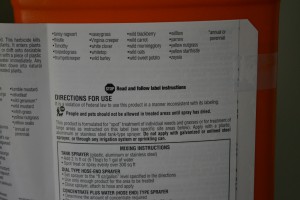You hear it all the time. Be sure to read the label before using any pesticide. Honestly though, is this a practice you really follow? It should be.
Sometimes we do not consider pesticides dangerous since we can buy them in most any retail store or garden center. Companies surely would not sell something to an average homeowner that is too toxic or dangerous.
Pesticides are chemicals that are used to kill insects, plants, and sometimes mammals. Even though many of the most dangerous chemicals are not available to homeowners, the products you find on stores shelves should still be used with care and attention. It is important to read the label. If not only to protect yourself, but to protect pets, children, wildlife, and water systems.
Each pesticide that you buy will come with a label. This label contains important information about the product. The following is a guide to the information found on a pesticide label and why it is required by law that you read it.
Active Ingredient: This is the chemical name of the pesticide and the part of the product that is active against the pest. Before buying your pesticide, look at the active ingredient to make sure that you are purchasing the right product for your specific job. You can not always judge a product by the trade name or brand name since several very different pesticides may have the same or very similar brand names.
Signal Words: The pesticide will either have Caution, Warning, or Danger in bold letters on the label. These words tell us the product’s level of toxicity. Caution – slightly toxic, Warning – moderately toxic; Danger – highly toxic. Most homeowner products will carry the Warning or Caution signal words.
Environmental Hazards: Many pesticides are toxic to birds, invertebrates, and mammals. Some products may not be used near water in order to protect wildlife. This section will guide you in ways to prevent damage to animals, groundwater, and soil.
Direction for Use. Each label will state how to apply the product so that it is most effective against the targeted pest. This will include rates, timing of applications, and pests controlled by the product. It is never beneficial to apply more than the label states.
Every label will contain additional information on precautions that need to be followed to safely use the pesticide and treatment if there is an accident. Since we are not able to predict when an accident will happen, make sure that you are always prepared by reading any pesticide label you will be using.
- Garden Spider Egg Sacs - October 23, 2025
- Saving Malabar Spinach Seeds - October 17, 2025
- Improve Butterfly Habitat with Trees - September 18, 2025

